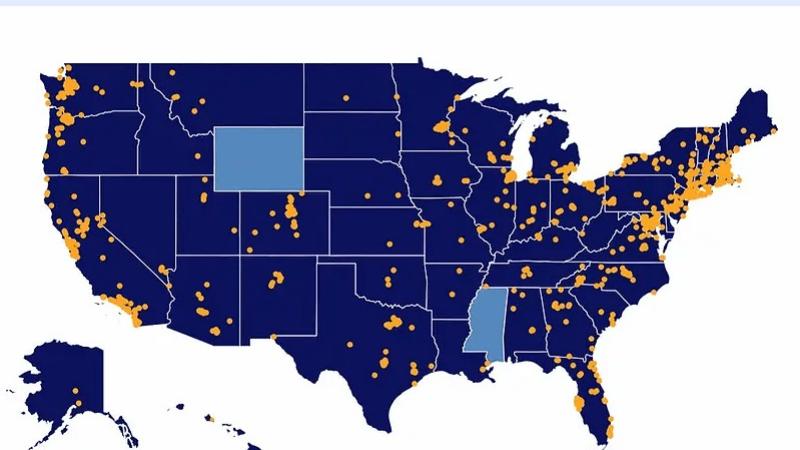National debt surpasses $34.9 trillion for first time in history
The top three outlays were Social Security ($129 billion), education ($90 billion) and net interest on the national debt ($81 billion).
The national debt has surpassed $34.9 trillion for the first time in U.S. history.
It did so as the federal government’s “borrowing binge and spending spree continues,” EJ Antoni, an economist with the Heritage Foundation, said.
Antoni points out that interest on the federal debt was “equal to 76% of all personal income taxes collected in June” and is the Treasury's “largest source of revenue and three-quarters of it gets consumed just by interest.” He then asked, “Does Congress know? Do they even care?”
According to the latest Treasury report, total receipts were $466 billion and total outlays were $532 billion in June, with a deficit of $66 billion. The top three sources of revenue were individual income taxes ($185 billion), social insurance and retirement taxes ($181 billion) and corporate income taxes ($81 billion).
The top three outlays were Social Security ($129 billion), education ($90 billion) and net interest on the national debt ($81 billion).
Net interest on the debt surpassed total spending for the Department of Health and Human Services ($75 billion), national defense ($67 billion), income security ($32 billion) and Medicare ($22 billion).
U.S. Rep. Mark Green, R-Tenn., who chairs the U.S. House Homeland Security Committee, commented on the report, saying it shows that the federal government “spent more on national debt interest ($81B) than national defense ($67B)” last month. “This is unsustainable. We must get spending under control – now.”
U.S. Rep. Chip Roy, R-Texas, who has been urging Congress to cut spending, including voting against appropriations bills, argues indebted Americans are not free. In a statement on the House floor ahead of the July 4 holiday, he said, “I would suggest to you that in supposedly the freest country in the history of mankind, that we are no longer free.”
Ahead of celebrating “the great birth of liberty that this country provided for the world … we have been stripped of that liberty. … We have been trading it away … right here from the floor upon which I stand … even this year.
“I'm exceptionally proud to be an American. I'm exceptionally proud to be in Congress. I believe that this country can and must be free again. But a country that has no borders, a country that is $35 trillion in debt, a country whose government is weaponized against its own people, a country that doesn't even know how to define man and woman or pay honor to the God upon which this nation was founded, is not a free country.”
U.S. Sen. Rand Paul, R-Kentucky, who has also historically voted against increased spending and been raising the alarm about the national debt for decades, said, “The national debt is the biggest threat to our country and your future. You pay for it through your wages. You’re making less because everything costs more, and that’s because we have this massive deficit. The uniparty has to stop its wasteful spending.”
In his latest report on government waste, Paul identified what he said was $900 billion of wasted taxpayer money.
On Oct. 31, 2021, his wife posted a picture on social media of him dressing up as the national debt in 2008 when it was $10 trillion, she said, “because we thought being $10 trillion in debt was pretty scary. Now, 13 years later, it’s $30 trillion. Terrifying!”
The national debt is now nearing $35 trillion. The U.S. began adding $1 trillion worth of debt about every three months beginning last June, The Center Square reported.
U.S. Rep. Thomas Massie, R-Kentucky, who wears a national debt clock, said earlier this year, “Our debt is increasing by $1 trillion dollars every 136 days. Which means, your family’s share of the debt is increasing by $10,000 every 136 days.”
Those who argue Congress should “just tax the rich,” translates to taxing “one million millionaires a million dollars each, every 136 days,” he said.
The “actual, true” federal debt is higher if the Treasury weren’t being drained, Antoni argues. The “true daily deficit” is being masked by the amount of cash Treasury Secretary Janet Yellen drains from the U.S. Treasury, he says.
In May, when the debt increased by $10.9 billion, he explained, “the true daily deficit was worse, requiring Yellen to drain another $5.7 billion from the Treasury cash account,” The Center Square reported. He also asked if Yellen was draining the Treasury as an “election year ploy … to make the deficit and debt look smaller than they really are?”
Right before the debt hit $34.9 trillion, on July 11, Yellen borrowed $28 billion, Antoni pointed out. Five days later, he said the debt will “blow past $35 trillion in no time” as Yellen borrows more money.













